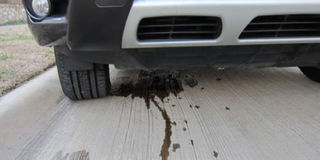Understanding leaks in your car

Understanding leaks in your car
Car leaks are common and can happen any time. You park your car at a shopping mall or home, but when you have completed your errands and all set on driving off, you realise there is a wet patch on the ground beneath it.
However, since you are in a rush, you drive off without finding out which specific fluid or part has been leaking. As the days go by, the leakages persist, and this could be a pointer to a much more complicated mechanical problem than you imagined.
Leakage in the power steering pump
Lawrence Kibomba, a mechanic with Shell Jinja Road, explains that when you turn the steering wheel, the softness with which it turns is dependent on the levels of the power steering fluid found in the steering wheel pump. The power steering fluid serves the same purpose as the Automatic Transmission Fluid (ATF) when steering. “If you find a brownish fluid on the ground where you have parked your car, it could mean that the ATF or power steering fluid in the steering pump is leaking. The more it leaks, the more your steering wheel becomes difficult to turn.”
Kibomba adds that these leakages could be from the power steering pump, hoses or the power steering reservoir that are all components of the car steering system.
Leaking engine oil
Kibomba says engine oil leaks manifest in thick black patches on the ground under the car. Although the oil may not leak rapidly, he advises that if the cause of the leakage is not fixed, it may lead to more complicated conditions, such as, engine stalling at an unexpected time.
“The engine piston rings could be old and need replacement. When there is a lot of engine oil pressure entering into engine compartments and it has nowhere to be used, the end result will be an oil leakage.”
Leakage from the air conditioner
Besides the car radiator, the other place capable of producing fluids beneath the car is the air conditioner. According to Musa Kimera, a mechanic at CKK Garage in Wandegeya, when water from the air conditioner flows beneath the car, it is something normal and does not call for alarm.
“When you find water from the air conditioning system on your car carpets, below the dashboard, it means it was supposed to flow through the system and drop beneath the car. It also means that there is a section of the system that is spoilt or damaged and needs to be repaired by an air conditioner technician.”
Kimera also says these leakages usually happen when the car air conditioner has been running most of the day.
Leaking brake fluid
Leaking brake fluid can be found beneath the front tyres, but not from the middle section of the car, like engine oil does.
“To function effectively, the car brakes ran on a hydraulic pressure system,” Kimera says, adding, “When you step on the brake, the brake fluid that is stored in the tank, serves as the hydraulic fluid that keeps the pressure. When there is a steady reduction in brake fluid amounts in the tank, it will lead to a significant fall in the pressure. In worst cases, this leads to brake failure.”
A brake fluid leak should not be ignored since it is risky to the driver’s live and the lives of other road users.
Fuel leaks
Martin Lubwama, a mechanic at Sam’s Auto Garage in Ndeeda, says the easiest way to determine if you have a fuel leak is when you detect the smell of fuel in the car interior. “If you park your car in a garage, the moment you open it, you should be able inhale leaked fuel. If you look beneath the car and find a patch near the rear tyres, it should alert you to a fuel leak.”
Unlike other leaks, Lubwama reasons that fuel leaks are the most dangerous and life threatening because of the ease with which the car will catch fire if it goes near an open flame. He advises motorist to visit a qualified mechanic the moment they inhale fuel in or around their cars.
The severity of brake fluid leakages
Take a look at the area underneath the car to try and pinpoint the leak. Assessing the leak’s severity will give you a good idea if the car is safe to drive. Any brake fluid leak should be repaired as soon as possible, but some leaks are worse than others. If your car is leaking more than just a drop or two at a time, it’s probably not a good idea to drive it. Larger leaks will compromise hydraulic pressure and cause your brakes to fail.




